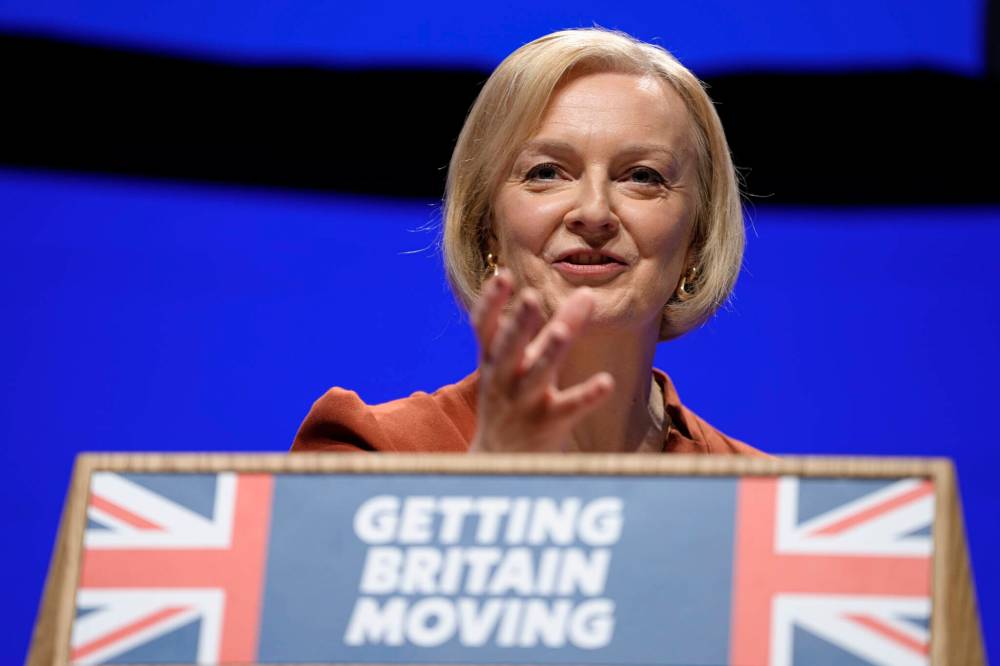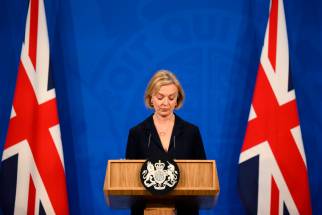Dawn of Britain’s new era has been delayed
Read this article for free:
or
Already have an account? Log in here »
To continue reading, please subscribe:
Monthly Digital Subscription
$0 for the first 4 weeks*
- Enjoy unlimited reading on winnipegfreepress.com
- Read the E-Edition, our digital replica newspaper
- Access News Break, our award-winning app
- Play interactive puzzles
*No charge for 4 weeks then price increases to the regular rate of $19.00 plus GST every four weeks. Offer available to new and qualified returning subscribers only. Cancel any time.
Monthly Digital Subscription
$4.75/week*
- Enjoy unlimited reading on winnipegfreepress.com
- Read the E-Edition, our digital replica newspaper
- Access News Break, our award-winning app
- Play interactive puzzles
*Billed as $19 plus GST every four weeks. Cancel any time.
To continue reading, please subscribe:
Add Free Press access to your Brandon Sun subscription for only an additional
$1 for the first 4 weeks*
*Your next subscription payment will increase by $1.00 and you will be charged $16.99 plus GST for four weeks. After four weeks, your payment will increase to $23.99 plus GST every four weeks.
Read unlimited articles for free today:
or
Already have an account? Log in here »
Hey there, time traveller!
This article was published 17/10/2022 (1147 days ago), so information in it may no longer be current.
As the week began, Liz Truss still held the formal titles of leader of Britain’s Conservative Party and prime minister of the United Kingdom. She had, however, lost the substance of leadership by abruptly reversing the taxing and spending plans that brought her to power.
The chancellor of the exchequer (finance minister) who carried out her tax-cutting instructions was dismissed. The new chancellor abandoned most of her tax cuts. The members of Parliament she was supposed to lead were not following her. She was not even following herself, since she was implementing a program she did not believe in.
The world is left wondering who, if anyone, is governing the United Kingdom. Financial markets, which torpedoed her first attempt at a budget, will play a large role. The civil service and Conservative Party bigwigs might try to fill the sudden power vacuum. Newly enthroned King Charles III may have to help assure Britain’s friends the country has not entirely dissolved into anarchy.

Britain’s Prime Minister Liz Truss has lost the substance of leadership by abruptly reversing the monetary plans that brought her to power. (Kirsty Wigglesworth / The Associated Press files)
Grassroots members of the ruling Conservative Party chose Ms. Truss as party leader ahead of former chancellor Rishi Sunak, by a vote of 81,326 to 60,399 on Sept. 2. Party members loved her promised tax cuts and disregarded warnings that she was going to drive the government deep into debt. Most of her parliamentary colleagues opposed her candidacy but they were outvoted by the party grassroots.
Her first chancellor, Kwasi Kwarteng, produced a Sept. 23 mini-budget cutting taxes right, left and centre without announcing corresponding spending cuts. Financial markets, concluding Britain’s government had ceased maintaining its solvency, dumped government bonds and British currency.
Ms. Truss dumped Mr. Kwarteng and appointed Jeremy Hunt in his place. Mr. Hunt on Monday announced reversal of most of the Sept. 23 measures.
At first glance, this would seem to be Mr. Sunak’s moment to take over as prime minister, reversing the Sept. 2 verdict that gave the party leadership to Ms. Truss. He would, however, be a leader without a party, since the great majority of British Conservatives rejected his candidacy just six weeks ago. He would also look like the latest buffoon in a comical parade of aspirants grasping for the top of the greasy pole.
Britain is due for a general election 15 months hence, in January 2025. As long as the Conservatives remain in power, they are unlikely to call an election sooner, because they are currently far behind the opposition Labour party in voter-intention surveys.
Ms. Truss, if she continues, or another Conservative, if she is replaced, will have only a tenuous and short-lived opportunity to govern and a seriously impaired mandate.

Canada and its trading partners are struggling to curtail inflation and guide economic recovery from the setbacks of the COVID-19 pandemic. The same countries are trying to defend Ukraine from Russian aggression without directly waging war against nuclear-armed Russia. In these circumstances, the industrial nations have been counting on the UK for wise, firm leadership – or at least a coherent policy.
The western democracies learned to get along without British political stability during the four-year premiership of the mercurial Boris Johnson. The circus-hall act at the centre of British politics seems set to continue for another year at least.
Britain’s exit from the European Union was intended to open a new era of British greatness and prosperity. The dawning of the new era may have to be rescheduled.
















